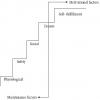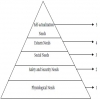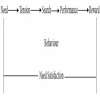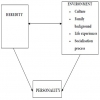Home | ARTS | Management Concepts & Organisational Behaviour
|
Mc GREGOR’S PARTICIPATION MODEL - Motivation
Management Concepts & Organisational Behaviour - Motivation
Mc GREGOR’S PARTICIPATION MODEL - Motivation
Posted On :
It was McGregor who set forth – at opposite extremes – two pairs of assumptions about human beings which he thought were implied by the actions of autocratic and permissive managers.
Mc GREGOR’S PARTICIPATION
MODEL
It was McGregor who set forth – at opposite extremes – two pairs of assumptions about human beings which he thought were implied by the actions of autocratic and permissive managers. First set of assumptions are known as “Theory X” and the second set of assumption are known as “Theory Y”. It is important to note that these sets of assumptions are not based on any empirical research. They, according to McGregor, are intuitive deductions.
Managers with Theory X orientation make the following assumptions about people:
-- Average human being has an inherent dislike for work and will avoid it, if he can.
-- The average human being is lazy and avoids responsibility.
-- The average human being is indifferent to organisational goals.
-- The average human being prefers to be directed, wishes to avoid responsibility, has relatively little ambition and wants security above all.
According to McGregor, this is a traditional theory where workers have to be persuaded and pushed into performance. Management can offer rewards to a worker who shows higher productivity and can punish him if performance is below standard. This is also called ‘carrot and stick’ approach to motivation. It suggests that threats of punishments and strict control are ways to control the people.
Managers with Theory Y orientation make the following assumptions about people:
-- The average human being does not inherently dislike work. Depending upon controllable conditions, work may be a source of satisfaction or a source of punishment.
-- The average human being will exercise self direction and self-control in the service of objectives to which he is committed.
-- Commitment to objectives is a function of the rewards associated with their achievement.
-- The average human being learns under proper conditions, not only to accept, but also to seek responsibility.
-- The capacity to exercise a relatively high degree of imagination, ingenuity and creativity in the solution of organisational problems is widely, not narrowly, distributed in the population.
Theory Y assumes that goals of the organisation and those of the individuals are not necessarily incongruent. Worker’s commitment is directly related to the satisfaction to their needs. Thus, this theory places great emphasis on satisfaction of the needs, particularly the higher ones of the employees. It does not rely heavily on the use of authority as an instrument of command and control. It assumes that employees exercise self-direction and self-control in the direction of the goals to which they feel themselves committed.
Theory X and Theory Y are important tools in understanding the behaviour of human beings and in designing the incentive schemes to motivate the employees. Neither of the two sets of assumptions is applicable fully in all situations and to all types of people. It appears that Theory X is more applicable to unskilled and uneducated lower level workers who work for the satisfaction of their basic needs of food, clothing and shelter. Theory Y appears to be more applicable to educated, skilled and professional employees who understand their responsibility and are self-controlled. However, there can be exceptions. A lower-level employee may be more responsible and mature than a well-qualified higher level employee. The examples of employees at higher levels in modern organisations shirking responsibility are not uncommon. Therefore, management should use an amalgamation of both the theories to motivate different types of employees.
It was McGregor who set forth – at opposite extremes – two pairs of assumptions about human beings which he thought were implied by the actions of autocratic and permissive managers. First set of assumptions are known as “Theory X” and the second set of assumption are known as “Theory Y”. It is important to note that these sets of assumptions are not based on any empirical research. They, according to McGregor, are intuitive deductions.
Theory X
Managers with Theory X orientation make the following assumptions about people:
-- Average human being has an inherent dislike for work and will avoid it, if he can.
-- The average human being is lazy and avoids responsibility.
-- The average human being is indifferent to organisational goals.
-- The average human being prefers to be directed, wishes to avoid responsibility, has relatively little ambition and wants security above all.
According to McGregor, this is a traditional theory where workers have to be persuaded and pushed into performance. Management can offer rewards to a worker who shows higher productivity and can punish him if performance is below standard. This is also called ‘carrot and stick’ approach to motivation. It suggests that threats of punishments and strict control are ways to control the people.
Theory Y
Managers with Theory Y orientation make the following assumptions about people:
-- The average human being does not inherently dislike work. Depending upon controllable conditions, work may be a source of satisfaction or a source of punishment.
-- The average human being will exercise self direction and self-control in the service of objectives to which he is committed.
-- Commitment to objectives is a function of the rewards associated with their achievement.
-- The average human being learns under proper conditions, not only to accept, but also to seek responsibility.
-- The capacity to exercise a relatively high degree of imagination, ingenuity and creativity in the solution of organisational problems is widely, not narrowly, distributed in the population.
Theory Y assumes that goals of the organisation and those of the individuals are not necessarily incongruent. Worker’s commitment is directly related to the satisfaction to their needs. Thus, this theory places great emphasis on satisfaction of the needs, particularly the higher ones of the employees. It does not rely heavily on the use of authority as an instrument of command and control. It assumes that employees exercise self-direction and self-control in the direction of the goals to which they feel themselves committed.
Application of Theory X and Theory Y
Theory X and Theory Y are important tools in understanding the behaviour of human beings and in designing the incentive schemes to motivate the employees. Neither of the two sets of assumptions is applicable fully in all situations and to all types of people. It appears that Theory X is more applicable to unskilled and uneducated lower level workers who work for the satisfaction of their basic needs of food, clothing and shelter. Theory Y appears to be more applicable to educated, skilled and professional employees who understand their responsibility and are self-controlled. However, there can be exceptions. A lower-level employee may be more responsible and mature than a well-qualified higher level employee. The examples of employees at higher levels in modern organisations shirking responsibility are not uncommon. Therefore, management should use an amalgamation of both the theories to motivate different types of employees.
Tags : Management Concepts & Organisational Behaviour - Motivation
Last 30 days 559 views
















